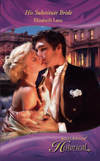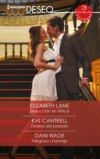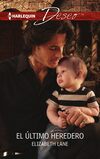Loe raamatut: «His Substitute Bride»
Praise for Elizabeth Lane
THE BORROWED BRIDE
‘…brims over with tender touches…’
—RT Book Reviews
ON THE WINGS OF LOVE
‘Lane uses her turn-of-the-century backdrop and her knowledge of aviation to her advantage in a lively story featuring strong-willed characters. She reaches for an audience searching for fresh historical territory in her charming feminist novel.’
—RT Book Reviews
THE STRANGER
‘…the warmth of an Americana romance and the grit of a tough Western…’
—RT Book Reviews
HER DEAREST ENEMY
‘…a pleasurable and well-executed tale…’
—RT Book Reviews
“Why, little Annie, I didn’t know you cared.”
The mischief had crept back into Quint’s eyes. “Maybe I should give this some thought.”
“Stop making fun of me!”
It was all Annie could do to keep from slapping the smirk off his face.
“Yes, I do care, you big, arrogant, smart-mouthed oaf. You’ve been my knight in shining armour since I was old enough to tell boys from girls. You were my hero, and I won’t stand back and watch you throw your life away on this…this…”
Her throat went tight, choking off her words. Merciful heaven, what had she just said to him?
Quint gazed down at her, his eyes glinting amber with reflected flame. Annie’s heart lurched as he tilted her chin upward, bent towards her and captured her mouth with his own. His lips were velvet and honey, possessing her from the very first touch…
His Substitute Bride
Elizabeth Lane

Elizabeth Lane has lived and travelled in many parts of the world, including Europe, Latin America and the Far East, but her heart remains in the American West, where she was born and raised. Her idea of heaven is hiking a mountain trail on a clear autumn day. She also enjoys music, animals and dancing. You can learn more about Elizabeth by visiting her website at www.elizabethlaneauthor.com
HIS SUBSTITUTE BRIDE features characters you will have met in THE BORROWED BRIDE
Previous novels by this author:
ANGELS IN THE SNOW (part of Stay for Christmas anthology)
HER DEAREST ENEMY
THE STRANGER
THE BORROWED BRIDE
and in Super Historical:
ON THE WINGS OF LOVE
For Teresa and Ted and for San Francisco
Chapter One
San Francisco, April 13, 1906
By the time Quint found the woman, she was dying. She lay faceup on the checkered linoleum, a dollar-size crimson stain oozing through the fabric of her plain white shirtwaist. It appeared she’d been stabbed.
“Virginia!” Quint crouched beside her, clasping her hand. “Can you hear me? It’s Quint Seavers!”
The blood-frothed lips moved slightly, but no sound emerged. She was a slight creature, about thirty, he judged, her plain features made plainer by the thick spectacles that lay askew on her nose. Quint was meeting her in person for the first time. But he already knew Virginia Poole to be honest and brave. The man responsible for this was damned well going to pay.
“The letter, Virginia!” His fingers tightened around hers. “Where is it? Can you tell me?”
But she was already gone, slipping away without a sound.
Releasing her hand, Quint cast his eyes around the shabby one-room apartment. The place had been ransacked. Furniture had been toppled, clothes thrown helter-skelter. Kitchen cupboards had been emptied, their contents strewn on the floor. The Murphy bed, which took up one wall, had been lowered, the mattress, quilt and pillow ripped to pieces.
Feathers eddied in the gaslit room, blown by a chilly draft from the open window. Whoever was here hadn’t been gone long. They’d probably climbed over the sill when they’d heard Quint pounding on the door. Judging from the mess and the hasty departure, he’d bet good money they hadn’t found what they were looking for.
And neither would he.
Quint cursed in frustration. The handwritten letter, linking Supervisor Josiah Rutledge to a crooked scheme involving funds for the city’s water system, would provide enough evidence to bring Rutledge down. Even more important, it would alert the public that this critical work wasn’t being done.
Quint had written more than a dozen articles for the San Francisco Chronicle, stressing the urgent need to repair the city’s crumbling network of pipes, aqueducts and cisterns and build a line to pump water out of the bay. Just last week he’d interviewed Dennis Sullivan, the city’s longtime fire chief, who’d stated that, given the faulty water system, a major fire could destroy much of the city, with loss of life in the hundreds, if not the thousands.
“This town,” Sullivan had declared, “is on an earthquake belt. One of these fine mornings we’ll get a shake that will put this little water system out, and then we’ll have a fire. What will we do then?”
For a balanced perspective, he’d also interviewed Mayor Eugene Schmitz and Supervisor Rutledge. Both had insisted that repairs were being made in good order.
And pigs could fly, Quint had groused as he left City Hall. Schmitz was almost as crooked as Rutledge. The whole mess stank like rotten fish. But he couldn’t just start making accusations. He needed solid proof.
The key to that proof had come yesterday, in the form of a phone call to his desk at the Chronicle. Virginia Poole, a clerk on Rutledge’s staff, had, by sheer accident, come across the damning letter in a stack of papers she’d been given to file. Knowing what she had, and being a woman of conscience, she’d called Quint and offered to give the letter to him.
He’d arranged to meet her the next evening in a bookshop off Portsmouth Square. When she’d failed to show up, Quint, who’d had the foresight to ask for her home address, had sensed that something was wrong.
Sadly, his instincts had been right.
Sick with dismay, he rose to his feet. At some point, Rutledge must have missed the letter and realized it had been scooped up with the other paperwork. Grilled by her boss, Virginia would have denied seeing it. But she’d probably been too nervous to convince him. One call and the hounds in Rutledge’s pay would have been on her trail, with orders to silence her and get the letter back.
It seemed indecent not to cover the poor woman with a sheet, or at least close her eyes. But Quint knew the police would soon be here, alerted by the very thugs who’d committed the crime. If they discovered his presence, he’d be hauled into jail as a murder suspect; and with so many cops in Rut-ledge’s pocket, odds were he wouldn’t live long enough to see the inside of a courtroom.
Leaving by the back stairs, Quint slipped into the alley and cut a meandering course down Telegraph Hill to Montgomery Street. The mist-shrouded night was damp and chilly, the lighthouse a great blinking eye in the darkness behind him. Foghorns echoed mournfully across the bay.
Thrusting his hands into his pockets, Quint lengthened his stride. Tomorrow at work he would call in some favors, find out whether Virginia’s murder was being investigated or merely hushed up. He would also make inquiries about her daily routine, talk to her friends, her family if she had any. With luck, maybe he could—
Oh, bloody hell!
Quint halted as if he’d slammed into a brick wall.
Tomorrow morning Clara and Annie would be arriving by train, all the way from Dutchman’s Creek, Colorado. Quint had arranged to take the entire week off. He had cleared his calendar of appointments, freeing his time to show them the city.
For weeks he’d looked forward to the visit. Six-year-old Clara was the most important person in Quint’s life. Every minute with the little girl was a gift. And Annie Gustavson, her maternal aunt, was always pleasant company. Neither of them had ever been to California. They were eager to experience the marvels of San Francisco.
Now this mess had dropped into Quint’s hands, and he had no choice except to deal with it.
It was too late to postpone the visit. Their train would be arriving at the Oakland terminal at 11:00 a.m. tomorrow morning. After such a long trip, he could hardly put them back onboard and send them home. Nor could he walk away from a story so rife with urgency.
What the devil was he going to do?
Quint hailed a cab to take him back to his Jackson Street apartment. Somehow, for the coming week, he would have to be in two places at once. If it meant working early mornings and late nights, or leaving Clara and Annie on their own once in a while, that couldn’t be helped. Virginia Poole had given her life to expose Rutledge. Whatever it took, Quint vowed, he would make sure she hadn’t died in vain.
“Where’s the ocean, Aunt Annie? I want to see it!” Clara bounced with excitement. Her nose smudged the window of the first-class railway car.
“All in good time, Miss Clara Seavers.” Annie resettled her weary buttocks against the vibrating seat cushion. She adored her sister Hannah’s child, but three days and nights on a rattling train with an active six-year-old had frayed her nerves. She looked forward to a quiet lunch, a lovely hot bath…and Quint. Especially Quint.
Damn his charming, impossible hide!
Maybe after this week, she would finally be over him.
Frank Robinson, who owned the hotel in Dutch-man’s Creek, had asked Annie to marry him three times. He was decent, kind and passably handsome, with enough money to keep her in comfort for the rest of her days.
Her sister Hannah thought she was crazy for turning Frank down. “You’re twenty-three years old, Annie!” she’d fussed. “What are you waiting for, a knight on a white horse?”
The question was wasted breath, and both sisters knew it. Quint Seavers was no shining knight. But Annie had worshipped him since her teens. That was why she’d turned down Frank Robinson and every other man who’d come courting. To say yes would be to turn her back on Quint—who, in all the years she’d loved him, had barely given her the time of day.
Annie had jumped at his invitation to bring Clara to San Francisco. She’d yearned to experience that great, pulsing city known as the Paris of the West. She was eager, as well, to see the new fashions and copy them for her clients back home. As for Quint…
Annie sighed. She had no illusions about why he’d sent her the ticket. He needed someone to accompany Clara and act as a nanny during the visit. Well, fine. She was determined to have a good time anyway. And she would do her best to see Quint through clear eyes. If she could convince herself the man wasn’t worth pining over, maybe she’d be ready to go back home and accept Frank’s proposal.
“Will Uncle Quint be there when we get off the train?” Clara asked.
“He said he would.”
“Did he promise?”
“In a way, I suppose he did.”
“Then he will.” Clara nodded happily. “Uncle Quint always keeps his promises! How much longer is it?”
“Not much longer. We should be there in time for lunch.” Annie slipped an arm around the little girl. “What do you suppose your mama and papa are doing without you?”
“I’ll bet Papa’s taking care of the ranch. And Mama’s resting. The doctor says she needs to rest a lot so the new baby won’t come before it’s s’posed to.”
Clara had always been a perceptive child. But Annie was surprised that she understood about Hannah’s difficult pregnancy. After a near miscarriage, her doctor had ordered bed rest for the next two months. Her husband, Judd, Quint’s older brother, was rightly concerned about her.
“And what about Daniel?” Annie asked, changing the subject. “What do you think he’s doing?”
“Being a pest. He’s always being a pest,” Clara said, dismissing her three-year-old brother. “I hope the new baby pesters him just like he pesters me. It’ll serve him right.”
“Clara, Clara!” Annie hauled the child onto her lap. “Here, look out the window. We’re coming into Oakland now. Soon you’ll be able to see San Francisco Bay. It’s almost like the ocean!”
“Will we ride on a boat?”
“Yes. We’ll be taking the ferry boat across the bay to San Francisco.”
“The fairy boat?” Clara’s eyes danced. “Will it have fairies on it?”
Annie laughed and hugged her niece. “No, silly, just people.”
Thirty minutes later the train pulled into the station. Plastered against the window, Clara scanned the platform. “There he is! There’s Uncle Quint! Look, he can see us! He’s waving!”
They gathered their things and filed down the aisle to the exit door. Quint was there to greet them, looking tired but unforgivably handsome in a light woolen topcoat and black derby. He helped Annie down the steps, then swept Clara off her feet, waltzing her around until she squealed with laughter.
Watching them, Annie felt the familiar ache. What a breathtaking pair they were, the man and the child. They had the same brown eyes and thick, dark chestnut curls, the same dimpled cheeks and dazzling smiles.
No one with eyes in their head could fail to guess the truth.
Clara was Quint’s daughter.
Rounding up a porter to load their bags, Quint ushered his charges toward the ferry terminal. Clara skipped along beside him, keeping up a stream of chatter. Annie, Quint noticed, had scarcely said a word.
He stole sidelong glances at her as they moved along the crowded platform. She’d always been an attractive girl, smaller and more delicately sculpted than her sister Hannah, her hair a deeper, tawnier shade of blond; her eyes darker and more intense, closer to gray than blue.
How old would she be now? Well past twenty, Quint was startled to realize. Why hadn’t she married? She was by far the cleverest of the Gustavson girls and almost as pretty as Hannah. She earned a good living, too, with the hats and clothes she fashioned for the ladies of Dutchman’s Creek. One would think she’d have men falling at her feet.
Today she wore a smart gabardine traveling suit in a soft russet that brought out the rose in her cheeks. Quint found the dainty hat that perched atop her upswept hair far more flattering than the monstrous creations women were wearing these days. Annie had probably sewn the entire outfit, as well as Clara’s navy blue sailor dress, which made her look like a demure little doll.
Clara was growing up too fast, Quint mused as he helped them onto the ferry. And he was missing out on far too much of her life. But that price was his to pay for leaving Hannah with child seven years ago.
They’d been longtime sweethearts, he and Hannah Gustavson. It went without saying that they would marry. But Quint had wanted to see something of the world first. He’d set off for the Klondike gold fields, not knowing that a single fumbling encounter had left Hannah pregnant. When Quint couldn’t be reached, his brother Judd had married her to give the baby the Seavers name. Quint had returned eleven months later to find that Hannah and Judd had fallen in love and become husband and wife in every way.
The first time Quint held his baby daughter, his heart had turned over. But even then he’d known what he needed to do. He had walked away, leaving his little girl to be raised in a happy home by the only father she’d ever known.
Much as it stung, Quint knew he’d done the right thing. The ranch was an ideal place to grow up. Judd and Hannah were devoted to their children and to each other. They allowed him to be involved in Clara’s life as her beloved, indulgent “uncle.”
It was all he could ask—and more than he likely deserved.
Annie’s eyes traced the outline of Quint’s broad shoulders as he lifted Clara onto a bench next to the rail. His unruly dark hair curled below the brim of his hat, brushing his collar in a way that made her want to reach out and stroke it with her fingertips. Nothing had changed. Quint was as compelling as ever. And she was just as fluttery and tonguetied as she’d been at fifteen, on the day she’d discovered she loved him.
It had been an April day, she recalled, under a bright Colorado sky. The hillsides were dotted with yellow buttercups and splashes of red Indian paintbrush. Returning birds staked out nesting territory with raucous calls.
With no promise of meat for the stewpot, Annie had loaded an old .22, the only gun her family owned, and set out for the hills to shoot a rabbit. Quint had come by an hour later, on his way home from seeing Hannah. Stopping his horse at a safe distance, he’d watched her plunking away at animals that wouldn’t hold still, missing every shot.
“So you’re the hunter of the family,” he’d teased.
“Somebody’s got to do it,” Annie had flung back. “Papa’s too tired. Mama’s too busy. Hannah’s too squeamish and Ephraim’s too young. That leaves me.”
“Not having much luck, are you?” he’d observed.
“That’s easy for you to say, Quint Seavers. When your family’s out of meat, all they have to do is butcher a steer. For us, it’s different. If you’re so smart why don’t you shoot one of these rabbits?”
“I can do better than that.” He’d swung off the horse and walked toward her. “I’ll teach you how to shoot one.”
And he had taught her—standing beside her, steadying her arm, showing her how to line up the bead in the notch and squeeze the trigger without jerking. His body had been warm through his flannel shirt, his hands soft and tough, like waxed saddle leather. His skin and hair had smelled of store-bought soap. She had breathed him into her senses, as if his essence could permeate every cell in her body.
By the afternoon’s end, Annie had shot two rabbits and lost her romantic young heart. Of course, she couldn’t let on. Quint was Hannah’s beau, and they would likely get married someday. But she could love him in secret, from a distance, like a maiden of old pining for Sir Galahad.
Over time she’d learned that Quint was no Galahad. He’d fathered Clara and broken her sister’s heart. She’d expected that would be enough to make her stop loving him. It wasn’t.
She was a grown woman now. But a glance from Quint could still turn her into a simpering teenager. On the train she’d felt strong and confident, ready to face him as an equal. Now, after two minutes with the man, her insides had turned to jelly. How was she going to manage a whole week without making a fool of herself?
Clara pressed against the rail, watching the water splash along the side of the ferry. “Is this the ocean?” she asked.
“This is just the bay. We’ll see the ocean later, maybe tomorrow.” Quint clasped her under the arms to keep her from leaning too far. “For now I have other plans. First we’ll stop by my flat to leave the bags and give you girls a chance to freshen up. Then we’ll go downtown to have lunch at Delmonico’s. How does that sound?”
“Delmonico’s?” Annie lifted an eyebrow as the cab began to move. “Goodness, I must say I’m impressed.”
“Where else would I go to show off the two loveliest ladies in San Francisco?”
“You were born with a silver tongue in your head, Quint Seavers. Such pretty words!” Did she sound clever or simply waspish?
“I make my living with words—some pretty, some not so pretty, but all true.” Quint settled back with one arm around his little girl. “How’s your sister?”
“Holding her own. The doctor says the baby’s doing fine. But Hannah doesn’t take well to bed rest. She’s not used to being idle.” A smile crept across Annie’s lips. “The last time we visited, she was sharing her bed with Daniel and Clara, two puppies, three dolls and a toy train!”
“That sounds like Hannah.”
“She’s the perfect mother.”
“I know—and Judd’s the perfect father.” Quint glanced down at Clara’s beribboned curls. “As for me, I’m doing my best to be a decent uncle.”
“You’re much more than that. Daniel loves the little trolley car you sent him. Maybe it’s time you had a family of your own, Quint.”
Quint shifted Clara onto his knee. “That’s a fine idea. But first I need to find the right sort of woman.”
“And what sort of woman would that be?” The minute she said it she regretted her words.
He hesitated. Her heart sank as she guessed the unspoken answer. Quint had never gotten over his lost love. That was why he’d never married. And that was one reason he was so devoted to Clara. The child was his souvenir, his own little piece of Hannah.
Maybe if she kept reminding herself of that, she could get through the week with her heart intact.
In no time at all they were docking at the ferry building with its impressive clock tower. Quint helped them ashore, saw to their luggage and summoned a horse-drawn cab. Soon they were traveling down Market Street, amid the wonders of San Francisco.
“Look, Uncle Quint! What’s that?” Clara pointed as a racing fire wagon, drawn by four horses, rounded the corner ahead of them. Bells clanged as they thundered closer. The cab driver pulled over to let them pass.
“They’re on their way to a fire,” Quint explained to the wide-eyed Clara. “That big tank on the wagon is the boiler for the steam pump. It helps them spray water to put the fire out.”
“Will they put it all out?”
“Let’s hope so. Sometimes we have bad fires here because the houses are close together and they’re mostly made of wood.”
“Is your house made of wood, Uncle Quint?”
He gave her a reassuring hug. “My apartment is in a nice brick building, so don’t you worry your pretty head. We’ll be fine there.”
As they chatted, Annie peered out the cab’s open side at the wonders of San Francisco. She’d been in Denver plenty of times to buy fabric and trim, but Denver was a backwater compared to this shining metropolis that throbbed with life and excitement. Buildings of stone and concrete towered around her like canyon walls. Traffic streamed by in a constant flood—horse-drawn cabs, wagons and buggies, new gasoline-powered autos and electric trolley cars that ran on tracks down the middle of the street.
And the people! Annie had never seen so many or so much variety. Vendors hawked their wares from carts on the sidewalks, everything from cabbages to gold watches and bright bolts of silk. Chinese men in dark, pajamalike garb, their heads crowned by black derby hats, darted among the crowds with burdens slung from poles on their shoulders. A gang of sailors jostled each other as a pretty, foreign-looking girl passed them. Two prosperous-looking businessmen stepped off a trolley and entered a bank.
Traffic sounds made a roar in Annie’s weary head. Right now she would gladly have traded lunch at Delmonico’s for a nice nap. But she knew Quint had planned the meal as a special treat. She would smile and do her best to enjoy it.
The stop at Quint’s apartment was brief, allowing for little more than hauling up the baggage and using the splendid porcelain facilities. They also met the smiling, middle-aged Chinese man called Chao, who worked as Quint’s cook and housekeeper.
The two-bedroom apartment was spacious and comfortable, with a brown leather settee and two matching chairs drawn up before the fireplace. The walls were paneled in walnut and sparsely but tastefully decorated with photographs Quint had taken on his visits to the ranch. There were shots of snow-covered peaks, willows in winter, the house, the barn, the cattle and the wagon loaded with hay. One picture showed Quint’s scruffy border collie, Pal, who’d lived into old age and passed on. Another showed a beautifully windblown Hannah on the porch with two-year-old Clara in her arms.
Annie couldn’t help wondering how Quint could afford such a place on a reporter’s salary. But then she remembered that he’d sold his share of the ranch to Judd and invested the proceeds. He would have all the money he needed. At the very least he could afford to take them to a nice lunch.
The name Delmonico’s had been synonymous with glamour and elegance for more than half a century. The San Francisco version was the most dazzling place Annie had ever seen. Glittering crystal chandeliers hung above what looked like acres of linen-covered tables decked with fresh flowers. Formally dressed waiters flitted among them, balancing silver trays the size of wagon wheels above the heads of the diners. Seated at a grand piano, a young black man played a tinkling waltz.
The waiter seated them at a table near a window and pulled out the brocade-covered chairs for Annie and Clara. Quint passed on their orders from the à la carte menu—braised chicken for Clara, poached salmon for Annie and a plate of oysters on half shell for himself. Then they waited for their orders, sipping fresh lemonade and nibbling from a platter of tiny crackers, smoked meats, pâtés and cheeses.
Clara’s ongoing chatter filled the need for conversation, allowing Annie to observe the diners. Most of the women wore skirts and jackets, beautifully cut and embellished with tucks and lavish embroidery. The fabrics almost made her drool—jewel-toned wools, raw silks, heart-stopping merinos and cashmeres, English tweeds to die for. And the hats! Merciful heaven, such hats! They were veritable museum pieces, piled with clouds of tulle, huge satin bows, artificial birds, sparkling jewels and jutting feathers. Annie had thought her own well-tailored suit and modest chapeau chic enough to wear anywhere. She had, in fact, been one of the most fashionable women on the train. But in this place she felt like a drab little country mouse.
“Why, Quint Seavers! What a surprise!” The speaker was a stunning woman with hair the color of a prairie sunset. She was dressed in a skirt and jacket of emerald silk bombazine, which looked costly enough to feed Annie’s mother, brothers and sisters for six months. A forward-curving black plume adorned her hat and framed one jade-colored eye.
“I missed you at the opening of my play,” she cooed. “You aren’t angry with me, are you, darling? After that awful scene at the club…”
“Not at all.” Quint rose. “Evelyn, I’d like you to meet Miss Annie Gustavson and my niece, Clara. Ladies, this is Evelyn Page, whose acting is the toast of San Francisco.”
Annie murmured a polite greeting. Ignoring her, Evelyn focused on Clara. “Your niece? What a delightful surprise! And she’s adorable! She looks enough like you to be your daughter!”
“So people say,” Quint muttered. “It’s good seeing you again, Evelyn. Save me a seat at your next opening night, and I’ll write you a nice review.”
“You’d better, you naughty man! Ta!” She sashayed toward the door with a flutter of her lace-gloved hand. Quint sighed as he took his seat.
“She’s pretty,” Clara said. “Are you going to marry her, Uncle Quint?”
“I hardly think Miss Page is the marrying kind,” Quint said.
“But she called you darling. Doesn’t that mean she loves you?”
Quint was saved from answering by the arrival of the waiter with their meals. Annie’s poached salmon, cradled on a bed of fresh, steamed kale, looked delicious, not like the lumpy gray-green morsels on Quint’s platter of shells. Annie had read about oysters, but she’d never seen them before. They looked downright revolting.
She gave them a tentative sniff and wrinkled her nose. “All I can say is, you’ve come a long way from Dutchman’s Creek, Mr. Seavers,” she teased.
Quint appeared not to have heard. He was staring at something—or someone—on the far side of the room. As she watched, his face paled, his eyes went flinty and his mouth hardened into a blade-thin line.
Tasuta katkend on lõppenud.




















